Treasures found at a 2nd Century Roman villa in Kent reveal that it was once home to a future Roman Emperor.
Lullingstone Roman Villa, near Orpington in Kent, just 20 miles from London, was first uncovered in the 1930s. It has been suspected for some time that the villa was home to a wealthy person, either Roman or British, but experts were unsure as to the owner's identity.
Now a high-quality intaglio, or seal, found just outside the villa during excavation is believed to have been the personal seal of Publius Helvius Pertinax who was governor of Britain between AD185 and 186 and went on to become Roman Emperor in AD193.
The seal is one of many Roman treasures found at the site, including coins and an elaborate floor mosaic.
Pertinax was born in August 126. He was originally a teacher before being commissioned into the Roman army and eventually became governor of the Roman provinces of Moesia (in the approximate location of the modern Bulgaria and the former Yugoslavia), Dacia (Romania), Syria and Britain.
Pertinax fled the Kent villa at the end of the 2nd Century amid a mutiny by his soldiers. The men then looted it for gold and silver.
Roman experts believe the looters prised the seal from a gold signet ring and then left it behind as worthless.
The remains of the Roman villa is open to the public. The site also has a hi-tech visitor centre.
Treasures found at second century villa in Britain reveal it was once home to future Roman Emperor
By Tony Bassett
18th August 2010
Daily Mail
Historians are becoming increasingly convinced that a villa uncovered 20 miles from London was once home to Britain's Roman Governor.
Since Lullingstone Roman Villa was first uncovered in the 1930s experts believed it was once the home of a leading Roman or wealthy Briton, but archaeologists were unsure of the owner's identity.
Now experts have re-examined treasures found at the site, near Orpington in Kent, and say it was almost certainly the home of Publius Helvius Pertinax.
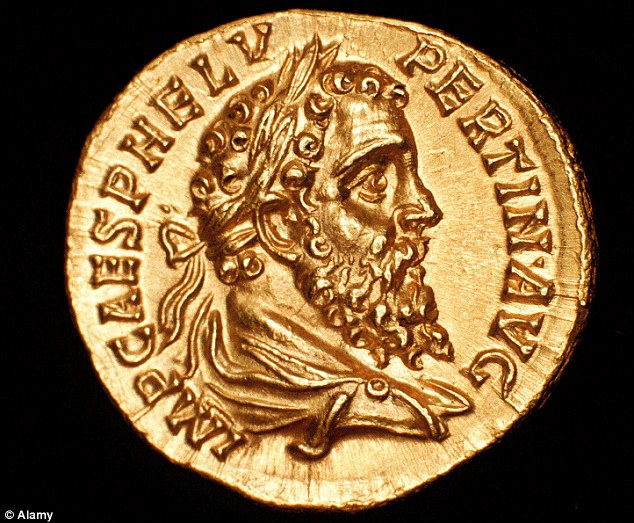
High-ranking: A coin featuring the head of Pertinax Publius Helvius, who ruled Britain in 185 and 186, after he was made Roman Emperor in 193
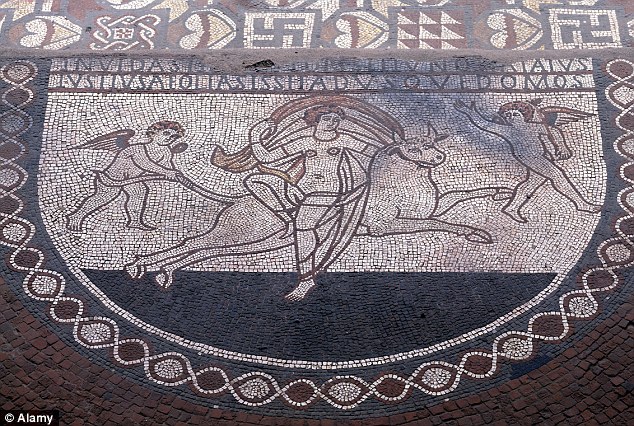
Luxury: An elaborate mosaic at Lullingstone Roman villa near Orpington, Kent. Experts believe it was the home of Pertinax, a former Roman Emperor, in the 100s
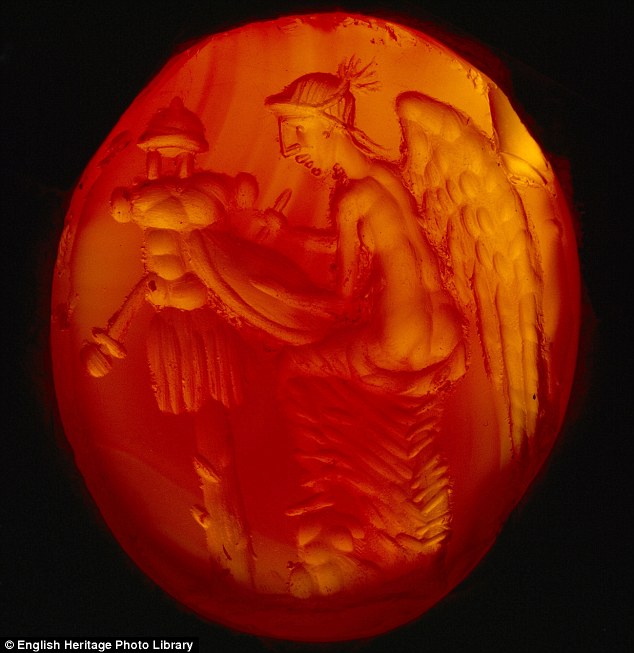
Proof: The intricate seal with a symbol of victory which is believed to be Pertinax's personal emblem
He was governor of Britain between AD185 and 186 and went on to become Roman Emperor in AD193.
A high-quality intaglio, or seal, found just outside the villa during excavation is now believed to have been the Governor's personal seal.
This finely-engraved victory gem was found next to some discarded coins.
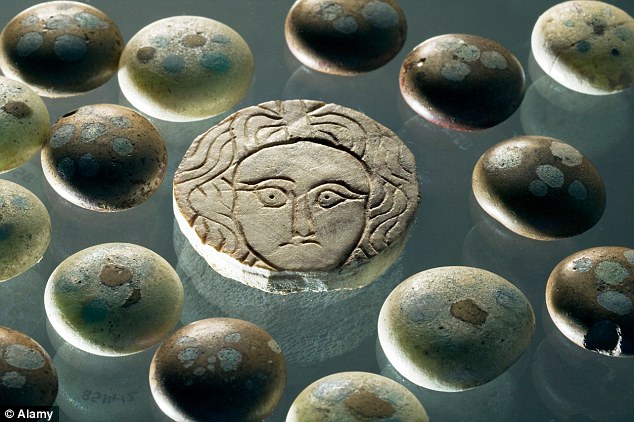
Treasures: Decorated glass gaming counters found at the second century site. Pertinax is believed to have fled the villa after soldiers mutinied

Historic: The visitor centre at Lullingstone Roman villa. Experts only previously knew it was lived in by a leading Roman or wealthy Briton
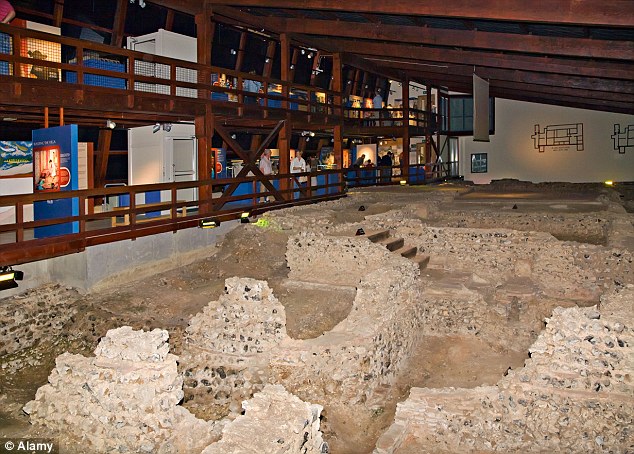
Status: A high-quality seal, believed to be from when Pertinax was British Governor, was also recovered near the villa
The governor is known to have fled the villa at the end of the second century amid a mutiny by his soldiers. The men then looted it for gold and silver.
Roman experts believe the looters prised the seal from a gold signet ring and then left it behind as worthless. There are signs the seal has been gouged with a knife.
Historians also say two portrait busts left behind were of the governor and, almost certainly, his father.
The one of Pertinax was left decapitated in an act of spite, probably carried out by an enraged soldier.
Joanne Gray, English Heritage curator of Lullingstone, said: 'We have always known that the site must have belonged to someone of high status because of its size, the quality of its mosaic floor and the archaeological finds.
'The image on the seal is one of victory. It is an image often used by Romans as a sign of imperial power.'
She said the research had been carried out by archaeologists Martin Henig, who lectures in Roman art and culture at Oxford University, and German archaeologist Richard de Kind.
Mrs Gray said: 'The research that has been done points quite strongly to Lullingstone being the home of Britain's governor. Everything seems to fit.'
Visitors to the villa, near the village of Eynsford, can still view the basement and foundation walls of the villa. Visit Lullingstone Roman Villa | English Heritage
PUBLIUS HELVIUS PERTINAX

Pertinax, as he was known, was born on August 1, 126, in Alba Pompeia, Italy.
He was originally a teacher of grammar, but was eventually commissioned as an officer in the Roman army.
After postings in the Parthian War, the Danube and Britain he received a number of promotions and went on to be governor of Moesia, Dacia, Syria and finally Britain.
After returning to Rome, he became a senator and was said to have been involved in the plot to assassinate Emperor Commodus in 192.
After the murder of Commodus, he was proclaimed as emperor, but his reign lasted just 86 days before he was killed by a cohort of 300 soldiers who stormed his palace.
dailymail.co.uk
Lullingstone Roman Villa, near Orpington in Kent, just 20 miles from London, was first uncovered in the 1930s. It has been suspected for some time that the villa was home to a wealthy person, either Roman or British, but experts were unsure as to the owner's identity.
Now a high-quality intaglio, or seal, found just outside the villa during excavation is believed to have been the personal seal of Publius Helvius Pertinax who was governor of Britain between AD185 and 186 and went on to become Roman Emperor in AD193.
The seal is one of many Roman treasures found at the site, including coins and an elaborate floor mosaic.
Pertinax was born in August 126. He was originally a teacher before being commissioned into the Roman army and eventually became governor of the Roman provinces of Moesia (in the approximate location of the modern Bulgaria and the former Yugoslavia), Dacia (Romania), Syria and Britain.
Pertinax fled the Kent villa at the end of the 2nd Century amid a mutiny by his soldiers. The men then looted it for gold and silver.
Roman experts believe the looters prised the seal from a gold signet ring and then left it behind as worthless.
The remains of the Roman villa is open to the public. The site also has a hi-tech visitor centre.
Treasures found at second century villa in Britain reveal it was once home to future Roman Emperor
By Tony Bassett
18th August 2010
Daily Mail
Historians are becoming increasingly convinced that a villa uncovered 20 miles from London was once home to Britain's Roman Governor.
Since Lullingstone Roman Villa was first uncovered in the 1930s experts believed it was once the home of a leading Roman or wealthy Briton, but archaeologists were unsure of the owner's identity.
Now experts have re-examined treasures found at the site, near Orpington in Kent, and say it was almost certainly the home of Publius Helvius Pertinax.

High-ranking: A coin featuring the head of Pertinax Publius Helvius, who ruled Britain in 185 and 186, after he was made Roman Emperor in 193

Luxury: An elaborate mosaic at Lullingstone Roman villa near Orpington, Kent. Experts believe it was the home of Pertinax, a former Roman Emperor, in the 100s

Proof: The intricate seal with a symbol of victory which is believed to be Pertinax's personal emblem
He was governor of Britain between AD185 and 186 and went on to become Roman Emperor in AD193.
A high-quality intaglio, or seal, found just outside the villa during excavation is now believed to have been the Governor's personal seal.
This finely-engraved victory gem was found next to some discarded coins.

Treasures: Decorated glass gaming counters found at the second century site. Pertinax is believed to have fled the villa after soldiers mutinied

Historic: The visitor centre at Lullingstone Roman villa. Experts only previously knew it was lived in by a leading Roman or wealthy Briton

Status: A high-quality seal, believed to be from when Pertinax was British Governor, was also recovered near the villa
The governor is known to have fled the villa at the end of the second century amid a mutiny by his soldiers. The men then looted it for gold and silver.
Roman experts believe the looters prised the seal from a gold signet ring and then left it behind as worthless. There are signs the seal has been gouged with a knife.
Historians also say two portrait busts left behind were of the governor and, almost certainly, his father.
The one of Pertinax was left decapitated in an act of spite, probably carried out by an enraged soldier.
Joanne Gray, English Heritage curator of Lullingstone, said: 'We have always known that the site must have belonged to someone of high status because of its size, the quality of its mosaic floor and the archaeological finds.
'The image on the seal is one of victory. It is an image often used by Romans as a sign of imperial power.'
She said the research had been carried out by archaeologists Martin Henig, who lectures in Roman art and culture at Oxford University, and German archaeologist Richard de Kind.
Mrs Gray said: 'The research that has been done points quite strongly to Lullingstone being the home of Britain's governor. Everything seems to fit.'
Visitors to the villa, near the village of Eynsford, can still view the basement and foundation walls of the villa. Visit Lullingstone Roman Villa | English Heritage
PUBLIUS HELVIUS PERTINAX

Pertinax, as he was known, was born on August 1, 126, in Alba Pompeia, Italy.
He was originally a teacher of grammar, but was eventually commissioned as an officer in the Roman army.
After postings in the Parthian War, the Danube and Britain he received a number of promotions and went on to be governor of Moesia, Dacia, Syria and finally Britain.
After returning to Rome, he became a senator and was said to have been involved in the plot to assassinate Emperor Commodus in 192.
After the murder of Commodus, he was proclaimed as emperor, but his reign lasted just 86 days before he was killed by a cohort of 300 soldiers who stormed his palace.
dailymail.co.uk
Last edited: